Gender and Choice after Socialism
Editat de Lynne Attwood, Elisabeth Schimpfössl, Marina Yusupovaen Limba Engleză Hardback – 7 mai 2018
The book will of interest to students and scholars across a range of subjects including gender and sexualities studies, history, sociology and political science.
| Toate formatele și edițiile | Preț | Express |
|---|---|---|
| Paperback (1) | 524.22 lei 6-8 săpt. | |
| Springer International Publishing – 24 ian 2019 | 524.22 lei 6-8 săpt. | |
| Hardback (1) | 698.94 lei 6-8 săpt. | |
| Springer International Publishing – 7 mai 2018 | 698.94 lei 6-8 săpt. |
Preț: 698.94 lei
Preț vechi: 822.29 lei
-15% Nou
Puncte Express: 1048
Preț estimativ în valută:
133.74€ • 139.65$ • 110.44£
133.74€ • 139.65$ • 110.44£
Carte tipărită la comandă
Livrare economică 15-29 aprilie
Preluare comenzi: 021 569.72.76
Specificații
ISBN-13: 9783319736600
ISBN-10: 3319736604
Pagini: 252
Ilustrații: XXIII, 245 p.
Dimensiuni: 148 x 210 mm
Greutate: 0.48 kg
Ediția:1st ed. 2018
Editura: Springer International Publishing
Colecția Palgrave Macmillan
Locul publicării:Cham, Switzerland
ISBN-10: 3319736604
Pagini: 252
Ilustrații: XXIII, 245 p.
Dimensiuni: 148 x 210 mm
Greutate: 0.48 kg
Ediția:1st ed. 2018
Editura: Springer International Publishing
Colecția Palgrave Macmillan
Locul publicării:Cham, Switzerland
Cuprins
Section I Choice and the State.- Half-Hidden or Half-Open? Scholarly Research on Soviet Homosexuals in Contemporary Russia.- Transgender, Transition, and Dilemma of Choice in Contemporary Ukraine.- From the Maidan to the Donbas: The Limitations on Choice for Women in Ukraine.- Section II Choice and Culture.- Narrating the Gender Order: Why Do Older Single Women in Russia Say That They Do Not Want to Be in Relationships with Men?.- Gender and Choice Among Russia’s Upper Class.- Choosing Whether to Have Children: A Netnographic Study of Women’s Attitudes Towards Childbirth and the Family in Post-Soviet Russia.- Section III Choice and Modernity.- Responsible Motherhood, Practices of Reproductive Choice and Class Construction in Contemporary Russia Between Militarism and Antimilitarism: ‘Masculine’ Choice in Post-Soviet Russia.- Bibliography.-Index
Notă biografică
Lynne Attwood is Honorary Fellow in Russian Studies (formerly Senior Lecturer) at the University of Manchester, UK. Her research is concerned with gender issues in Russia in a range of contexts such as film, housing, and women's magazines.
Elisabeth Schimpfössl is Lecturer in Sociology and Policy at Aston University, UK. Her research looks into questions around elites, power and social inequality.
Marina Yusupova has a PhD from the University of Manchester, UK. Her current research explores the changing normative orders of masculinity in Russia from the late Soviet period.
Elisabeth Schimpfössl is Lecturer in Sociology and Policy at Aston University, UK. Her research looks into questions around elites, power and social inequality.
Marina Yusupova has a PhD from the University of Manchester, UK. Her current research explores the changing normative orders of masculinity in Russia from the late Soviet period.
Textul de pe ultima copertă
The end of socialism in the Soviet Union and its satellite states ushered in a new era of choice. Yet the idea that people are really free to live as they choose turns out to be problematic. Personal choice is limited by a range of factors such as a person’s economic situation, class, age, government policies and social expectations, especially regarding gender roles. Furthermore, the notion of free choice is a crucial feature of capitalist ideology, and can be manipulated in the interests of the market. This edited collection explores the complexity of choice in Russia and Ukraine. The contributors explore how the new choices available to people after the collapse of the Soviet Union have interacted with and influenced gender identities and gender, and how choice has become one of the driving forces of class-formation in countries which were, in the Soviet era, supposedly classless.
The book will of interest to students and scholars across a range of subjects including gender and sexualities studies, history, sociology and political science.
The book will of interest to students and scholars across a range of subjects including gender and sexualities studies, history, sociology and political science.
Caracteristici
Uniquely explores gender relations and politics in the post-Soviet region through the lens of choice Presents the first work focusing specifically on choice as an ideology of neoliberalism in the post-Soviet context Brings the two fields of gender and sexuality into conversation with each other
